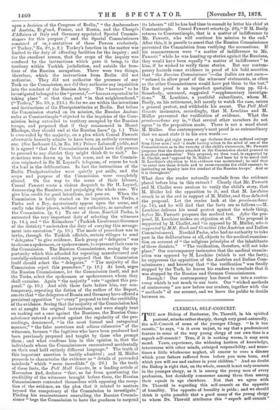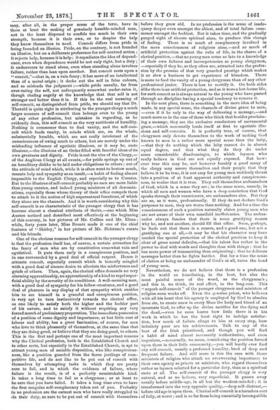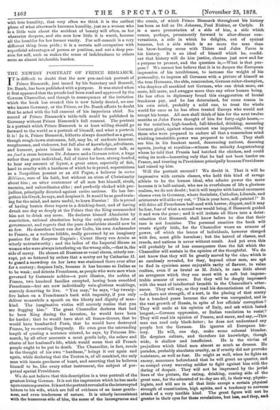CLERICAL SELF-CONCEIT.
HE new Bishop of Rochester, Dr. Thorold, in his spirited pastoral, attacks rather sharply, though very good-naturedly, the self-Conceit of some of the younger Clergy. "Is it too caustic," he says, "is it even unjust, to say that a predominant feature in some of the very young clergy of our own time is a superb self-conceit? True, if it is nothing worse, it may soon mend. Years, experience, the widening horizon of knowledge, intercourse with other minds, enlarged responsibility, and some- times a little wholesome neglect, all concur to cure a disease which your fathers suffered from before you were born, and- which you will see and endure in your children." And no doubt the Bishop is right that, on the whole, conceit is not only common in the younger clergy, as it is among the young men of every profession, but decidedly commoner among them than among their equals in age elsewhere. Not that we agree with Dr. Thorold in regarding this self-conceit as the opposite of humility. The opposite of humility is pride ; and we should think it quite possible that a good many of the young clergy to whom Dr. Thorold attributes this " superb self-conceit" may, after all, in the proper sense of the term, have in them at least the making of genuinely humble-minded men, not in the least disposed to confide too much in their own strength, because it is their own, or to despise the help they know themselves to need. Conceit differs from pride in being founded on illusion. Pride, on the contrary, is not founded on illusion, but on a deliberate preference for self-centred action ; it rejects help, because it is help ; it repudiates the idea of depend- ence, even when dependence would be not only right, but a duty ; it endeavours to stand alone, even when standing alone involves 'failure, rather than lean upon another. But conceit rests upon a " conceit,"—that is, on a vain fancy; it has more of an intellectual than of a moral origin ; it decks out the self in false colours, and so misleads the judgment ;—while pride usually, far from over-rating the self, not unfrequently somewhat under-rates it, though chafing angrily at the knowledge that that self is not stronger and better than it is. If this be the real meaning of self-conceit, as distinguished from pride, we should say that Dr. "Thorold is quite right in attributing to the younger clergy a much larger measure of self-conceit than belongs even to the young of any other profession, but mistaken in regarding, as he evidently does, this self-conceit as the very antithesis of humility. Nothing is commoner than to find vanity, and the self-con- -ceit which feeds vanity, in minds which are, on the whole, -substantially humble, which are not really intolerant of the consciousness of owing much to others, but are merely under the misleading influence of egotistic illusions, or it may be, caste illusions,—the illusions of an Order filled with fanciful ideas of its own greatness and dignity. Pride is not the vice of the Clergy,— of the Anglican Clergy at all events,—for pride springs up out of. an hereditary dislike to be laid under obligations to others ; out of the attitude of mind which, while it is often wont to bestow much, -resents help and sympathy as an insult,—a habit of feeling almost impossible to the English Clergy, and especially so to Curates. But to the illusions of self-conceit probably no men are more liable than young curates, and indeed young ministers of all denomin- ations, especially those whose theory of their office compels them to attach to it the notion of high supernatural functions, of which they alone are the channels. And it is worth considering why this self-conceit is so characteristic of the younger clergy that it has -become almost a classical attribute of theirs,—one which Miss Austen noticed and described most effectively at the beginning -of this century, in her pictures of Mr. Collins and Mr. Elton ; while, forty years later, Miss Brontë made it one of the chief features of " Shirley," in her picture of Mr. Helstone's curate and his friends.
One of the obvious reasons for self-conceit in the younger clergy is that the profession itself has, of course, a certain attraction for the fancy of men who are by constitution somewhat vain and egotistical. It puts them early in a conspicuous position, and in one surrounded by a good deal of official respect. Hence it attracts conceit, especially conceit which is honestly mingled with a good deal of sincere desire to alleviate the misfortunes and griefs of others. Then, again, the clerical office demands no very alarming apprenticeship, no apprenticeship of a kind to repel super- ficial ability by the severity of its conditions. A well-meaning man, with a good deal of sympathy for his fellow-creatures, and a good -deal of pleasure in any display of that sympathy which enables laim to see himself in a graceful and conspicuous position, is very apt to turn instinctively towards the clerical office, as one likely to satisfy both the higher and the feebler part of his nature, and to satisfy it without requiring any very forced march of preliminary preparation. The immediate possession of a position of some dignity and importance, at but little cost of labour and ability, has a great fascination, of course, for men who love to think pleasantly of themselves, at the same time that they are doing good, or believe that they are doing good, to others. This is the first and perhaps one of the most important reasons why the Clerical profession, both in the Established Church and in other sects, but especially in the Established Church, is apt to attract young men of amiable disposition, who like conspicuous- mess, like a position guarded from the fierce jostlings of com- petitive life, and do not like to be put out of conceit with themselves by attempting tasks in which they are pretty sure to fail, and in which the evidence of failure, where failure is the result, is of a perfectly unmistakable kind. It takes a long time to fail as a clergyman ; or at least to be sure that you have failed. It takes a long time even to have the first sanguine self-complacency taken out of you. Probably in no profession are the earnest men who have really struggled to do their duty, so sure to be put out of conceit with themselves before they grow old. In no profession is the sense of inade- quacy deeper even amongst the ablest, and of total failure com- moner amongst the feeblest. But it takes time, and the gradually purged sight of sincere spiritual aims, to produce this change of feeling. There is so much of complacency involved in the mere consciousness of religious aims,—and so much of artificial protection against the rubs of life, in the charm of a clerical position,—that no young men come so late to a knowledge of their own failures and incompetencies as young clergymen, —especially if they be, as they often are, attracted into the profes- sion by the promise of that very guarded prestige which makes it so slow a business to get experience of blunders. There is more to feed the vanity of a young clergyman than of any other professional junior. There is less to mortify it. On both sides alike there is an artificial protection, and as it were a hot-house life, for such conceit as is always natural to the young who have passed through no discipline having a special tendency to remove it.
In the next place, there is something in the mere idea of being made, in any special sense, the channels of divine grace to men, — even if it be only in the way of delivering a message,—and much more so in the case of those who think that besides proclaim- ing a message, they are the exclusive conductors of sacramental grace,—which necessarily lends itself at first to egotistic illu- sions and self-conceits. It is perfectly true, of course, that clergymen only devote themselves to the work of making God known to men in a rather more special sense than the laity, — that they do nothing which the laity cannot do in almost equal degree, and that what they do they do under some considerable disadvantages, to which laymen who really believe in God are not equally exposed. But how- ever true this may be, and however frankly a good many of the clergy may assure themselves and their people that they believe it to be true, it is not easy for young men suddenly thrust into a position of at least apparent authority and conspicuous- ness, to realise that it is true. They call themselves ambassadors of God, which iu a sense they are ; in the same sense, namely, in which all men and women who have a deep conviction that God speaks through their consciences, are ambassadors also. But they are so, as it were, professionally. If they do not declare God's purposes to men, they are worse than nothing. And for a time the consciousness of such a position naturally elates young men who are not aware of their own manifold inefficiencies. The ambas- sador always fancies that there is some gratifying reason why lie, and not another, should fill that office. Soon, perhaps, he finds out that there is a reason, and a good one, but not a gratifying one at all,—it may be that his character may have needed the special protection of the clerical position to keep it clear of gross moral defaults,—that his talent lies rather in the power to deal with words and thoughts than with things ; that he has more power of transmitting than originating ; that he delivers messages better than he fights battles. But for a time the sense of elation at being an ambassador of God's at all, turns the head of young men.
Nevertheless, we do not believe that there is a profession in the world so humiliating, in the best, but also tho most painful sense of the word, as the clergyman's ; and this is, we think, its real effect, in the long-run. This "superb self-conceit" of the younger clergymen and ministers of religion soon works off. Even the genuine priest, who believes with all his heart that his agency is employed by God to absolve from sin, to create anew in every Mass the body and blood of an incarnate God, to offer up the divine sacrifice for the dying and the dead,—even he soon learns how little there is in his work in which he has the least right to indulge satisfac- tion, how much of failure clings to him at every step, how infinitely poor are his achievements. Talk to any of the best of the Irish priesthood, and though you will find a habit of mind almost necessarily 'authoritative, and even imperious, —necessarily, we mean, considering the position forced upon them in their little community,—you will hardly ever find any self-conceit, usually a profound humility, bred of deep and frequent failure. And still more is this the case with those ministers of religion who attach no overweening importance to their own agency as priests or ministers, who regard themselves rather as laymen selected for a particular duty, than as a spiritual caste at all. The self-conceit of the younger clergy is very natural, and as we believe, very superficial. It passes away usually before middle-age, in all but the weakest-minded ; it is transformed into the very opposite quality,—deep self-distrust,- before old age is upon them. Clerical self-conceit is a harmless sort of folly, at worst ; and is so far from being essentially incompatible
with true humility, that very often we think it is the earliest phase of what afterwards becomes humility, just as a woman who is a little vain about the accident of beauty will often, as her character deepens, and she sees how little it is worth, become all the humbler for her former vanity. For self-conceit is a very different thing from pride ; it is a certain self-occupation with superficial advantages of person or position, and not a deep pas- sion for self, such as makes the sense of indebtedness to others seem an almost intolerable burden.




































 Previous page
Previous page